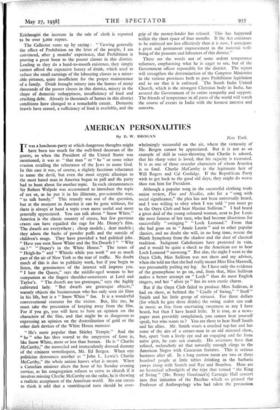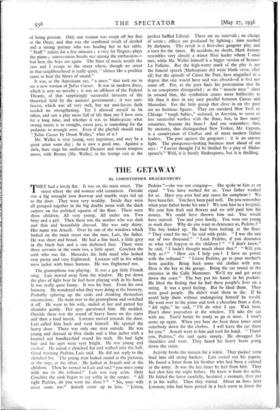AMERICAN PERSONALITIES
By D. W. BROGAN
New York.
TT was a luncheon-party at which dangerous thoughts might have been too much for the well-bred decorum of the guests, so when the President of the United States was mentioned, it was as "that man" or " he " or some other evasion recalling the reluctance of the Jews to name God. In this case it was, of course, a slightly facetious reluctance to name the devil, but even the most cryptic allusiops to the most hated man in America began to pall and th€ party had to hunt.about for another topic. In such circumstances Sir Robert Walpole was accustomed to introduce the topic of sex or, as he put it in his illiterate, pre-scientific way, "to talk bawdy." This remedy was out of the question, but at the moment in America it can be gone without, for there. is always at hand a topic even more useful and more generally appreciated. You can talk about "Snow White." America is the classic country of crazes, but few previous crazes can have equalled the rage for Mr. Disney's film. The dwarfs are everywhere ; cheap models ; dear models ; they adorn the backs of powder puffs and the outside of children's mugs. They have provided a bad political joke. "Have you seen Snow White and the Six Dwarfs ? " "Why six ? " " Dopey's in the White House." The tunes of " Heigh-ho " and "Whistle while you work" are as much part of the air of New York as the roar of traffic. No doubt much of this is due to publicity work, but if you begin to listen, the genuineness of the interest will impress you. "I hate the Queen," says the middle-aged woman to her companion as she fingers shoulder-ornaments at Lord and Taylor's. "The dwarfs are too grotesque," says the highly cultivated lady. "But dwarfs are grotesque objects," warmly objects the businessman who has only seen six films in his life, but is a "Snow White" fan. It is a wonderful conversational resource for the visitor. But, like me, he must take the precaution of keeping away from the film. For if you go, you will have to have an opinion on the characters of the film, and that might be as dangerous as expressing an opinion on the desterilisation of gold or the other dark devices of the White House monster.
"He's more popular than Shirley Temple." And the " he " who has thus soared to the empyrean of fame is, like Snow White, more or less than human. He is "Charlie McCarthy," the monocled and immaculately dressed dummy of the eminent ventriloquist, Mr. Ed Bergen. When one politician denounces another as "John L. Lewis's Charlie McCarthy," the whole nation knows what is meant. When a Canadian minister alters the hour of his Sunday evening service, as his congregation refuses to come to church if it involves missing Charlie McCarthy on the radio, he is showing a realistic acceptance of the American world. No one seems to think it odd that a ventriloquial turn should be over- whelmingly successful on the air, where the virtuosity of Mr. Bergen cannot be appreciated. But it is not as an example of skill in voice-throwing that Charlie is adored, that his sharp voice is loved, that his sagacity is treasured. It is as one of those oracular characters of whom America is so fond. Charlie McCarthy is the legitimate heir of Will Rogers and Cal Coolidge. If the Republican Party wish to get back to the good old days, they might do worse than run him for President.
Although a popular song in the successful clothing trade union review, Pins and Needles, asks for a "song with social significance," the plea has not been universally heard, and I was willing to obey when I was told "you must go to the Onyx Club and hear Maxine Sullivan." I had heard a great deal of the young coloured woman, next to Joe Louis the most famous of her race, who had become illustrious for successfully " swinging " "Loch Lomond." From that she had gone on to "Annie Laurie" and to other popular classics, and no doubt she will, in no long time, rescue the Ninth Symphony from the shadow and the dust of classical tradition. Indignant Caledonians have protested in vain, and it would be quite a shock to the American ear to hear Loch Lomond " unswung." But alas, the night I went to the Onyx Club, Miss Sullivan was not there and my adviser, when she told me that she had really meant Miss Elsa Maxwell, was presumably pulling my leg. So I have only the evidence of the gramophone to go on, and, from that, Miss Sullivan makes a better attempt on " Loch " than do most English singers, and her "afore ye" has its own exotic charm.
But if the Onyx Club failed to produce Miss Sullivan, it had on show, as befitted the "Cradle of Swing," " Stuff " Smith and his little group of virtuosi. For three dollars (for which he gets three drinks) the swing zealot can soak in music as free from enervating sweetness as any I have heard, but then I have heard little. It is true, as a news- paper man peevishly complained, you cannot hear yourself speak, but who wants to ? You are there to hear Stuff Smith and his allies. Mr. Smith wears a crushed top-hat and has some of the airs of a corner-man in an old minstrel show, but, apart prom a lively eye. and an engaging and far from naive grin, he cuts out comedy. His assistants have that refined, melancholy air that naturally enough clings to the American Negro with Caucasian features. This is serious business after all. In a long narrow room are two or three hundred people at little tables drinking in the barbaric yawps along with Scotch and Rye and Bourbon. Here are no hysterical schoolgirls of the type that turned "the King of Swing" (Mr. Benny Goodman's) Carnegie Hall concert into that imitation of the Bacchae which so pleased the Professor of Anthropology who had taken the precaution of being present. Only one woman was swept off her feet at the Onyx, and that was the combined result of alcohol and a strong partner who was hauling her to her table. " Stuff " retires for a few minutes ; a very fat Negress plays the piano ; conversation breaks out among the enthusiasts— but here the boys are again. The blast of music assails the ears and I escape to the street where, though no street in that neighbourhood is really quiet, "silence like a poultice came to heal the blows of sound."
It was, as the Americans say, "a must" that took me to see a new version of Julius Caesar. It was in modern dress, which is now no novelty ; it was an offshoot of the Federal Theatre, of that surprisingly successful invasion of the theatrical field by the national government ; it was anti- fascist, which was all very well, but my anti-fascist faith needed no strengthening. Yet I allowed myself to be taken, and saw a play more full of life than any I have seen for a long time, and whether it was to Shakespeare what swung music is to straight, sweet jazz, is something for the pedantic to wrangle over. Even if the playbill should read "Julius Caesar by Orson Welles," what of it ?
Mr. Welles is very young, very ingenious, and may be a great actor some day ; he is now a good one. Against a dark, bare stage his uniformed Dictator and storm troopers move, with Brutus (Mr. Welles) in his lounge suit as the perfect baffled Liberal. There are no intervals ; no change of scene ; effects are produced by lighting ; time marked by darkness. The result is a first-class gangster play and a tract for the times. By accident, no doubt, Mark Antony resembles very closely a minor Nazi leader whom I once met, while Mr. Welles himself is a bigger version of Senator La Follette. But the high-water mark of the play is not the funeral speech (Shakespeare did write blank verse, after all) but the episode of China the 'Poet, here magnified to a degree that one would have said was absurd—if it had not come off. For, as the poet finds his protestation that he is no conspirator disregarded ; as the "muscle men" close in around him, the symbolism comes more brilliantly to life than it does in any easy parallel between Caesar and Mussolini. For the little group that close in on the poet are no fictitious figures. They are standard New York or Chicago "tough babies," reduced, in America, to more or less successful warfare with the State, but, in how many countries, become the State ? And one remembers that, by ancestry, that distinguished New Yorker, Mr. Capone, is a countryman of Clodius and of more modern Italian leaders. The poet against the gangsters : it is an uneven fight. The prosperous-looking business man ahead of me says : "I never thought I'd be thrilled by a play of Shake- speare's." Well, it is hardly Shakespeare, but it is thrilling.



















































 Previous page
Previous page